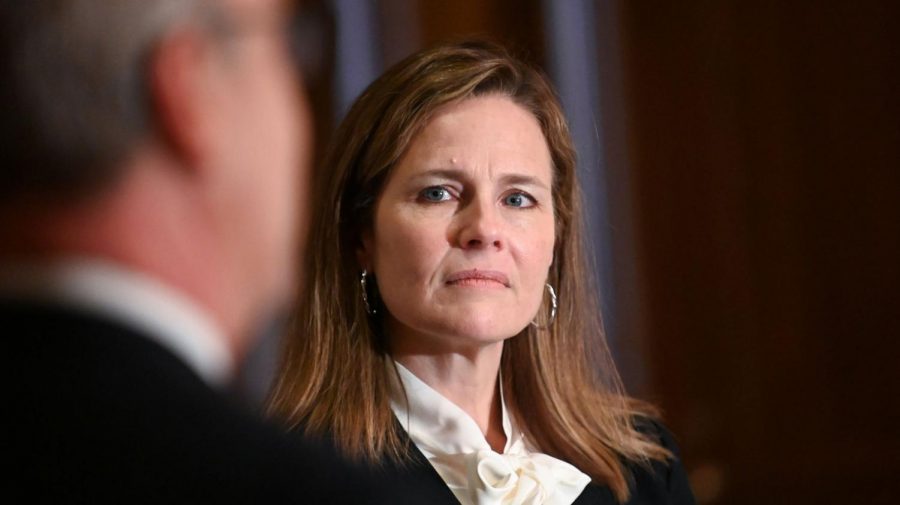Barrett is the Wrong Choice for the Supreme Court
Judge Amy Coney Barrett has been appointed to replace Justice Ruth Bader Ginsburg on the Supreme Court. (Courtesy of Twitter)
October 7, 2020
It’s been a tumultuous week for America: COVID-19 cases have continued to spike from the recently-cemented, bleak milestone of 200,000 deaths in the U.S. alone. Following that, the first presidential debate between President Trump and former Vice President Joe Biden devolved into a shouting match. Subsequently, the president — who has repeatedly downplayed the virus and departed from the advice of medical experts — was diagnosed with coronavirus along with First Lady Melania Trump. However, it would be more appropriate to say that these past few weeks have been particularly taxing, as, amid all of these dilemmas, one additional issue directly affects the fate of justice in America as we know it: President Trump’s nomination of Amy Coney Barrett to the Supreme Court.
On Sept. 18, America lost a giant for justice in Ruth Bader Ginsburg, who devoted 27 years to the Supreme Court. However, before Americans were even able to begin grieving a loss of such magnitude, President Trump made it clear that he intended to replace Justice Ginsburg as soon as possible. This ignited a wave of controversy as he sought to secure the nomination with unprecedented speed and during an election year — something former President Barack Obama drew criticism for. The president’s actions show no signs of becoming any less controversial, as his nomination of Amy Coney Barrett not only entails another seat filled in the Supreme Court but could also spell the reconstruction of American justice.
Amid a global pandemic, where the topic of health care is unavoidably front and center, choosing Amy Coney Barrett could not be a worse decision for all Americans. First off, Barrett has not exactly made it a secret that she is a staunch opponent of abortion rights.
If appointed, Barrett is highly likely to vote against abortion rights, stripping millions of American women of their right to choose, thus reversing Justice Ginsburg’s progress on women’s rights. Additionally, President Trump has been dedicated to repealing and replacing the Affordable Care Act. However, he has shown no signs of developing a plan to replace it, leaving a substantial portion of the nation reliant on the Affordable Care Act in limbo. In the era of COVID-19, this limbo will undoubtedly take a turn for the worse with Judge Barrett’s confirmation. Given her track record of being a loyal conservative, she will likely vote in favor of dismantling the Affordable Care Act, puncturing the health insurance lifeboat for upwards of 17 million Americans. Not only would a Justice Barrett lead to the unravelling of years of progress from her predecessor Ruth Bader Ginsburg, but it would also lead to the dangerous compromisation of American healthcare in times where health is, unfortunately, not a guarantee for many Americans.
It cannot and must not be mistaken that such expeditious moves from the president to appoint Barrett are apolitical. Everything in this exudes political interest and excludes Americans’ interests, as pollings from StarTribune show 55% of American voters feel the president should wait until after the election. In comparison, only 39% feel Barrett should be appointed immediately. Moreover, appointing Barrett could derail any momentum Democrats hoped to gain in the Supreme Court, as she is sure to mark a paradigm shift in the execution of justice that favors conservative ideals. Even worse, Barrett could come to be the final decision-maker in disputes regarding the 2020 presidential election, which faces mounting scrutiny from President Trump who continues to cast doubt about the legitimacy of mail-in voting. If President Trump were to win and there was suspected election interference as there was in 2016, Joe Biden may feel compelled to contest the results. If he does, he will likely have a hard time doing so in the Senate, as it is majority Republican.
Moreover, this would not be eased with Barrett on the Supreme Court, as she is likely to vote in favor of President Trump because of her conservative values and loyalty to the president. This is in no way meant to diminish the plausibility of a second Trump victory, as it is possible that he may win legitimately in 2020. However, the thought of President Trump winning through foreign interference must be enough to make any American squirm with fear and disgust. For if this haunting vision were to come to pass, Barrett would not aid in preventing such a heinous situation: She would be contributing to it.
This marks a stark contrast to the legacy of Justice Ginsburg. Indiscriminate of her liberal political standing, she was willing to work with fellow justices across the aisle and gained much adulation as a result. This is because she worked with the sole intent of ensuring a more just America for her constituents and put the American people above her personal political interests or agenda. It is highly uncertain if the same could be said about Barrett, as Trump has made it clear through his past appointments of staff and cabinet members that he expects loyalty. However, it is unclear if Barrett will give her loyalty to the American people she is to preside over or to the president’s personal machinations.
In taking over Ginsburg’s position, Barrett will serve as the president’s ideal conservative eraser to the liberal frameworks written by Ginsburg in the Supreme Court. Justice Barrett could erase the health insurance of millions of Americans during a pandemic, erase women’s right to choose and perhaps aid in the hindrance of a fair election.
Noah Osborne, FCRH ’23, is a journalism major from Harlem, N.Y.












If her Catholic ideals are so awful, why did you choose to go to a Catholic school?